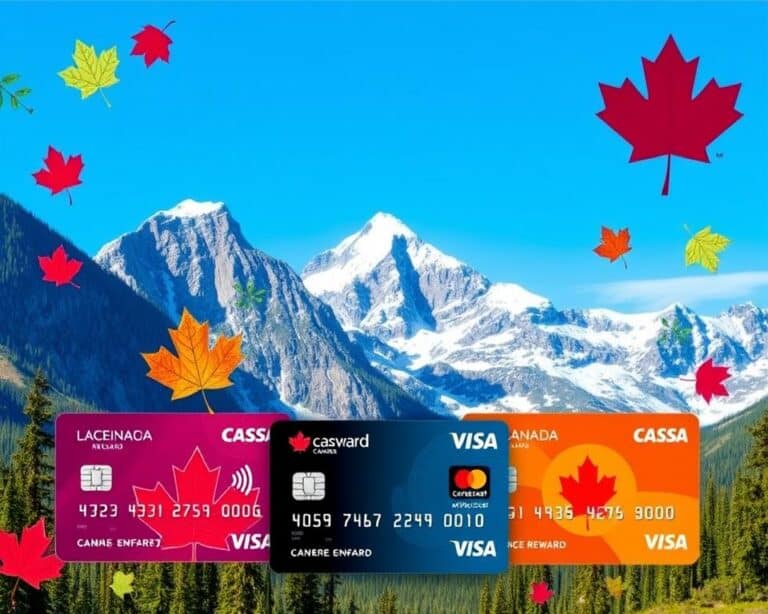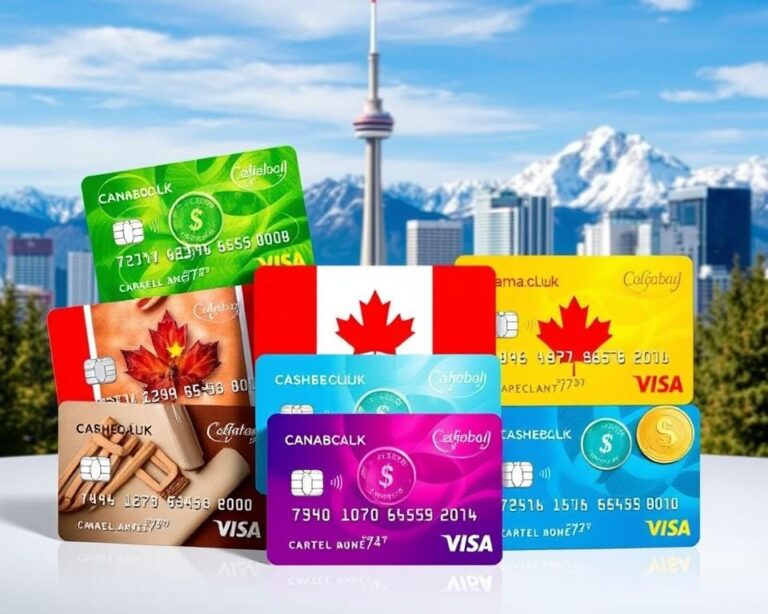advertisement
Did you know nearly one in three Canadians has a credit score under 600? This shows many people struggle with credit. If you have a low score, getting credit cards in Canada seems tough. But, there are options to help you improve your financial situation.
Learning about credit is key to rebuilding yours. It might seem hard, but knowing what to do can help. This article will show you how to find the right credit cards. It’s all about making smart choices for a better financial future.
Understanding Bad Credit in Canada
Bad credit can really hurt your finances. It’s important to know what bad credit is and how it affects your money. This is key for anyone dealing with credit in Canada.
What Constitutes Bad Credit?
The bad credit definition means a score under 600 in the credit score range Canada. Scores are based on how you pay bills, your debts, and how long you’ve had credit. Big credit reporting agencies like Equifax and TransUnion look at these to judge your creditworthiness. A low score means you’re seen as a bigger risk by lenders, often because of missed payments or too much debt.
How Bad Credit Affects Your Finances
The impact of bad credit is wide-reaching. Those with low scores may struggle to get credit cards, loans, or mortgages. Even when they can get credit, it usually has higher interest rates.
This creates a debt cycle that’s tough to break. It affects not just loan chances but also your lifestyle. Knowing this can motivate you to work on improving your credit.
Types of Credit Cards Available
There are two main types of credit cards: secured and unsecured. Each has its own benefits and requirements. It’s important to know the differences to choose the right one for you.
Secured vs. Unsecured Credit Cards
Secured credit cards need a cash deposit to secure your credit line. This deposit is like collateral and sets your credit limit. Unsecured credit cards don’t need a deposit. They give you credit based on how good your credit is.
People with low credit scores often find secured cards easier to get. This is because lenders see them as less risky.
Advantages of Each Type
Secured credit cards have several benefits:
- Easier approval chances: You’re more likely to get approved with a secured card.
- Credit rebuilding options: Paying on time can help improve your credit score.
- Increased credit awareness: Using a secured card teaches you how to manage credit responsibly.
Unsecured credit cards also have their own advantages:
- No upfront deposit required: You can get credit without needing to put down a deposit.
- Variety of rewards and perks: Many unsecured cards offer rewards, cashback, or travel benefits.
- Potentially higher credit limits: You might get a bigger credit limit as you show you can pay on time.
Both secured and unsecured credit cards can help improve your credit score. The right choice depends on your financial situation and goals.
| Feature | Secured Credit Cards | Unsecured Credit Cards |
|---|---|---|
| Deposit Required | Yes | No |
| Approval Chances | Higher | Varies |
| Credit Limit | Based on deposit | Based on creditworthiness |
| Rewards Program | Limited | Often available |
| Credit Rebuilding | Effective | Effective |
Credit Cards for Bad Credit Canada
In Canada, finding credit cards for bad credit is possible. Many financial institutions offer special products for those with less-than-perfect credit. It’s important to understand these options to make the best choice for your financial goals.
Overview of Options Available
Canada has several credit card options for those with bad credit. You can find:
- Secured credit cards: Require a cash deposit as collateral.
- Unsecured credit cards: Typically have higher interest rates but do not require a deposit.
- Store credit cards: Often easier to obtain and valid for purchases at specific retailers.
Key Features to Look For
When choosing a credit card, look at key features. These can greatly affect your finances. Consider the following:
- Annual fees: Keep an eye on fees to avoid unnecessary costs.
- Interest rates: Lower rates can save you money if you carry a balance.
- Rewards programs: Some cards offer benefits like cashback or points on purchases.
- Credit limits: A reasonable limit prevents overspending while allowing you to build credit.
Comparing credit cards helps you make a better choice. By looking at the benefits, you can pick a card that helps you manage and improve your credit score.

How to Improve Your Chances of Approval
To boost your chances of getting a credit card, prepare well and know what lenders look for. By following certain steps, you can make your application stand out. This can lead to a better decision from the lender.
Steps to Take Before Applying
Before you apply for a credit card, consider these steps:
- Check your credit report: Find any mistakes that could hurt your score. Fix any errors to improve your chances.
- Pay off existing debts: Paying off debts shows you’re financially responsible. It also helps your credit score.
- Review your credit score: Knowing your score helps you find the right credit card for you.
- Gather documentation: Have your income proof and ID ready. This makes the application process smoother.
Factors Lenders Consider
Lenders look at several important factors when evaluating your application:
- Credit utilization ratio: Use less than 30% of your credit to show you’re financially savvy.
- History of payments: Paying on time improves your credit score and shows you’re reliable.
- Employment stability: A steady job shows you’re financially secure, which lenders like.
- Overall financial behavior: Lenders check how you spend to see if you can handle new payments.
How to Choose the Right Credit Card
Choosing the right credit card is important. You need to think about interest rates, fees, and credit limits. These factors can affect your money and credit score. Knowing about them helps you make smart choices for your money goals.
Comparing Interest Rates and Fees
Start by comparing different credit cards. Look at the interest rates for buying things and getting cash. High rates can cost a lot if you don’t pay off your balance.
- Check for hidden fees like annual fees or charges for using cards abroad.
- Consider rewards or special offers, but think about the ongoing costs too. Make sure the card is good for you.
- Use online tools to compare cards easily.
Understanding Credit Limits
It’s key to understand how credit limits work and their effect on your money habits. The credit limit is the most you can borrow. Keeping your balance low helps your credit score.
| Credit Card | Interest Rate (%) | Annual Fee ($) | Credit Limit ($) |
|---|---|---|---|
| Card A | 19.99 | 0 | 500 |
| Card B | 21.99 | 99 | 1000 |
| Card C | 18.50 | 49 | 750 |
Think about how raising your credit limit might change your credit utilization. If done right, a higher limit can help keep your utilization low and boost your score.
The Application Process Demystified
Applying for a credit card can seem scary, especially if you have bad credit. Knowing the credit card application requirements and having the right necessary documentation can make things easier. By having a good application checklist, you can boost your approval chances and avoid problems.
What Information You’ll Need
Before you apply, make sure you have all the important details. This includes:
- Personal identification details such as government-issued ID.
- Proof of income, such as pay stubs or tax documents.
- Details of your existing credit obligations, including any loans or other credit cards.
- Social Insurance Number (SIN) for verification purposes.
Having this info ready helps avoid common application mistakes that could cause avoiding denials.
Common Mistakes to Avoid
Many people make mistakes when applying for credit cards. To increase your chances of approval, keep these tips in mind:
- Submitting incomplete applications can lead to automatic rejections.
- Misunderstanding credit card terms may result in unexpected fees or costs.
- Applying to multiple cards simultaneously can negatively impact your credit score.
By knowing these application pitfalls, you can do better. Double-check your info to make sure it fits the credit card application requirements for a better outcome.

Using Your Credit Card Responsibly
Managing your credit card wisely is key to better financial health. You can do this by using smart payment strategies and keeping an eye on your credit usage.
Making Payments on Time
Being on time with payments is crucial. It helps avoid late fees and keeps your credit score high. Here are some tips to help:
- Set reminders on your calendar for due dates.
- Enroll in automatic payments for at least the minimum amount.
- Develop a monthly budget to keep track of your expenses.
By making timely payments, you improve your credit score.
Monitoring Your Credit Utilization
It’s important to watch your credit utilization ratio. Try to keep it under 30% of your total credit limit. Here are some ways to monitor it:
- Regularly check your credit card statements for balances.
- Limit your spending to remain well within your credit limits.
- Check your credit report frequently to identify any discrepancies.
By keeping an eye on your credit usage, you can keep your credit score high. This opens up better financial opportunities for you.
Rebuilding Your Credit Score
Improving your credit score is key to better financial opportunities. Using the right techniques can help you build credit and secure a healthier financial future. This section will guide you on how to improve your score and understand the timeline for credit score improvement.
Strategies for Improvement
Several strategies can help improve your credit score. Here are some effective methods to consider:
- Diversify Credit Types: Having a mix of different types of credit can be beneficial. Consider options like installment loans alongside credit cards.
- Timely Payments: Ensure that all payments are made on time. A single late payment can drastically affect your score.
- Low Balances: Aim to keep your credit card balances low relative to your limits. This habit positively impacts your credit utilization ratio.
- Avoid New Debt: While attempting to improve your score, refrain from taking on additional debt that could unnecessarily complicate your finances.
How Long It Takes to See Results
The timeline for credit score improvement varies based on several factors. You may begin to notice gradual improvements in your score within a few months of implementing this credit rebuilding process. The key influencing aspects include:
- Payment History: Consistently making payments on time can yield quicker results.
- Credit Utilization: Managing your balances effectively will positively reflect on your score quicker than you might expect.
- Length of Credit History: Longer credit histories can contribute to a more stable score; be cautious about closing old accounts.
Understanding the credit rebuilding timeframe allows you to set realistic expectations. While some improvements can be seen within a few months, significant changes often require sustained efforts over a longer period. Embrace these strategies for credit score improvement as essential steps toward a better financial future.
| Strategy | Expected Timeline for Improvement |
|---|---|
| Diversify Credit Types | 3-6 months |
| Timely Payments | 1-3 months |
| Low Balances | 1-2 months |
| Avoid New Debt | 3-12 months |
Alternatives to Credit Cards
If credit cards don’t fit your financial plans, look into other options. There are many choices, each suited for different needs. Knowing their benefits can guide you in making smart financing decisions.
Other Financing Options
There are ways to get the funds you need without credit cards. Here are a few:
- Personal Loans: These loans have fixed rates and set payments, making it easier to budget. Many lenders offer personal loans even if your credit isn’t perfect.
- Lines of Credit: This option lets you borrow as needed. It’s great for managing regular expenses.
- Peer-to-Peer Lending: It connects you with investors, often at lower rates than banks. Approval might be easier too.
When to Consider a Loan Instead
Knowing when to choose a personal loan over a credit card is key. Here are times when a loan might be better:
- Large Expenses: For big costs like home fixes or medical bills, loans can be cheaper than credit cards.
- Debt Consolidation: If you have many debts, a loan can combine them. This might lower your interest rate and simplify payments.
- Fixed Financing Needs: For a specific amount over a certain time, a loan offers a clear repayment plan.
Conclusion
This summary highlights the importance of knowing your financial situation. Whether you’re looking at secured or unsecured credit cards, understanding the pros and cons is crucial. Rebuilding your credit takes time, but with effort, you can achieve financial recovery.
When improving your credit, start by monitoring your credit use and paying on time. Every step you take helps build a stronger credit profile. This opens doors to better financial opportunities later on.
With the right approach and tools, overcoming bad credit is possible. Use this chance to learn and improve your financial health. Your path to getting credit cards in Canada is a step towards a better financial future.
FAQ
What options are available for getting credit cards for bad credit in Canada?
In Canada, you have several options for credit cards even with bad credit. You can look into secured credit cards, which need a deposit. Or, you might consider unsecured cards with higher rates and fees. Many banks, credit unions, and online lenders offer special products to help you improve your credit.
How does bad credit impact my financial situation?
Bad credit can really hurt your finances. It means you might face higher interest rates and struggle to get loans. If your credit score is below 600, it’s considered poor. This can limit your financial opportunities.
What should I look for when choosing a credit card for bad credit?
When picking a credit card for bad credit, look at annual fees, interest rates, rewards, and credit limits. Know the terms and costs to avoid surprises. This helps you find the right card for your needs.
What steps can I take to improve my chances of being approved for a credit card?
To boost your approval chances, check your credit report for mistakes, pay off debts, and know your credit score. Lenders look at your credit use, payment history, and financial habits. Keeping these areas in check can help your application.
How can I ensure I use my credit card responsibly?
Using your credit card wisely means paying on time and keeping an eye on your credit use. Try to use less than 30% of your limit. Set reminders and make a budget to manage payments and avoid late fees.
What strategies can help me rebuild my credit score?
To boost your credit score, use different types of credit, keep balances low, and pay on time. Being consistent is key. With the right habits, you can improve your score over time.
What alternative financing options do I have if a credit card isn’t suitable?
If a credit card isn’t right for you, look into personal loans, lines of credit, or peer-to-peer lending. Each has its own benefits and rules. Choose what fits your financial goals best.



